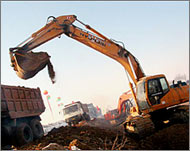China’s property market
Tens of millions of Chinese have been busy placing their life savings in property construction, an investment that appears to offer both functionality and long-term growth.

This is an industry that has been likened by some experts to the Alaskan Gold Rush frenzy, a century ago.
The half completed Park Avenue International Apartment, one of China’s premier real estate development sites, is located in the heart of Beijing. The going price is RMB 12,000/sqm ($1500) and it is already 70% sold.
Allen Kuo, a US-born Chinese, demonstrated his faith in China by recently buying an apartment in Shanghai as an investment.
“I needed some diversification away from the US markets. Although the real estate market is risky, so long as one has a diversified portfolio, Shanghai is a reasonable investment,” he said.
Like many other foreigners and Chinese alike, Kuo sees a future in a country where year on year GDP growth of minimum 7% fuels rising house prices and sustains a burgeoning middle class keen to buy.
In turn, property developers have responded to this latest aspect of “socialism with Chinese characteristics” by plowing money into real estate ventures.
Investments mushroom
Residential property investment has grown by 30% annually over the last three years, sparking concerns that market supply is in a different league from market demand.
“In both the Beijing residential and commercial markets, there is an over supply of Grade A space,” said Richard Lum, Deputy General Manager of property advisers Debenham Tie Leung.
 |
|
Development at record pace |
“I would expect to see the Beijing market heading for a correction within a few years as new projects come online,” he said.
As development continues at record pace in order to beat a 2006 deadline for the removal of cranes in time for the Olympics, results posted showed vacancy rates in Beijing had increased markedly during the first half of 2003. Grade A office and residential vacancies was at 17% and 26% respectively.
In Shanghai, where the effect of SARS was less felt, rates were at 15% and 18%. Given that the first few months of 2003 saw a 37% increase in market investment compared with 2002, alarm bells have started ringing in government ministries.
For the government, a strong real estate market has been one of the lynchpins of the new economy. Over a quarter of all bank loans, RMB1.8 trillion ($222bn) are tied to the property market, either through loans to investors or through mortgages.
With outside analysts estimating 40-50% of all bank loans as being non-performing, unchecked market growth and subsequent collapse would have wide reaching implications.
This monetary conundrum is a relic of the 90s when state banks were given free rein to lend money out in a system where paybacks and misappropriation are commonplace.
Debts
Until recently, according to Li Da, a consultant with a major Hong Kong construction firm, it was possible for a developer to build with virtually zero capital.
|
“Although the real estate market is risky, so long as one has a diversified portfolio, Shanghai is a reasonable investment.” Allen Kuo, US-Chinese investor |
“All a developer needed was some architect’s drawings and a wooden model. Prospective buyers, going for the cheapest purchase price, would pay deposits on a non-existent structure. Construction companies, desperate for the work would commit 20-30% of the total building cost hoping to reclaim it later and cash rich banks would chip in with the rest,” said Da.
The result was that when financial difficulties take hold, the developer having no reserves of their own went belly up.
“There is not one construction company that is debt free,” explained Li Da, “and this is even after the government insisted all outstanding debts to construction companies should be paid.”
The results of this behaviour speak for themselves. Abandoned building sites, although less common in Beijing and Shanghai, litter the landscape in second tier cities like Qingdao and Xining. With the current situation of high vacancy rates and decreasing rents, revenues and loan repayments are being squeezed.
State action
The government, though, has seen the problem and is moving to adjust it. This month, the People’s Bank of China moved to increase the initial down payment paid by an individual buyer from 20 to 40% of total value thereby reducing mortgage costs on the banks.
More crucially, they are set to increase interest rates payments for developers borrowing to finance high end projects as well as limit the amount developers can borrow.
“The government wants to ensure that developments in the pipeline are in line with what can be purchased by ‘healthy’ buyers who have the ability to repay and are buying for their own use or investment instead of speculating on property prices,” explained Michael Hart, Research Head at Jones Lang LaSalle Shanghai.
“By being explicit about higher down payment, the government effectively is controlling the pace of property development,” he said.
The aim is to curtail spending on glitzy, high end projects and instead focus developers’ attention on the middle to lower market where there is currently great demand. By doing so, they stave off a banking crisis while addressing the social needs of China’s masses. It is a delicate balance.
“These are all small moves, if the banks squeeze too hard, they will choke everyone to death,” said Li Da.
Comparisons with Japan of the early 1990s have been whispered, as a banking collapse there is still impacting on the country’s economic performance a decade on.
It remains to be seen whether China’s banks can tip tow their way through this minefield as they wait for growing prosperity among local companies to account for the vacant space.